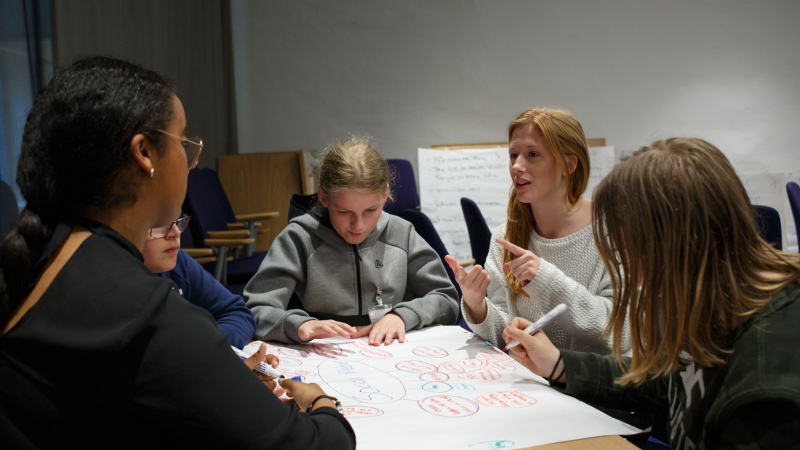Three Ways Great Books’ Discussions Lead to Critical Thinking and Good Manners—And Why This is So Important

Have you ever known a time when you are in the midst of a family, church, or business crisis? Maybe some of you have held public office, or will someday, and you are bound to face a crisis of some sort. When crises happen, leadership ability and character are revealed. They are most keenly revealed in the discussions that happen when a group of leaders gather around a table or meet online. At these meetings, ideas are suggested, considered, and approved or discarded. In those times—those crucial times—it is of tantamount importance to have thoughtful people who can speak strongly and critically (about ideas) and who don’t poison the discussion through pride or brutality. It is a critical advantage to have people that possess this ability. Failing to have a team of leaders with these skills can lead to disaster.
That is why it is so essential that we raise up students who can think critically and who possess the humility that should result from vigorous and passionate discussions. There is no better way to prepare this sort of student than by putting them together with other students and important ideas which allow them to practice for real discussions and decisions on weightier matters in the future.
Here are three reasons why discussing the ideas in the Great Books leads to critical thinking and good manners.
- Discussions Force You to Think in a Fluid Environment
In a discussion, you might know the issue or question that your group is trying to settle, but you do not know one important thing: what other people are going to say next. They, in turn, have no idea what you are going to say. This dynamic encourages each person to find a position, consider supporting and contradicting evidence (what others say), often amending one’s original position, and build consensus toward resolution. When you see a student mastering this skill it is something to behold. (It should also strike us that at the highest levels of our culture so little of this sort of debate actually occurs.) It is not something that can be done very well on Facebook or Twitter. It almost never happens in political debates. It does, however, happen every day in families, churches, businesses, and governments as leaders look to find solutions to practical problems.
- Being Challenged and Bested Engenders Humility and Empathy
When I was a freshman football player in high school after my season was done, the coaches let me and a few other freshmen have an opportunity to practice with the varsity and JV players for a few weeks. It was quite a privilege. During the first practice with the older players, I was put in during a scrimmage playing linebacker against the varsity starting offense. I wanted to impress the coaches and other players. I made a few tackles, disrupted a few plays, and, I think, actually sacked the quarterback once. Wow! I thought, “I am the man! I am making these varsity players look really bad.” During the next play, the varsity quarterback was scrambling and I was chasing him. Suddenly, everything went sideways and crooked. One of the starting guards knocked me off the ground and landed on me with a thud. Our faces ended up next to each other. He whispered, “That will be enough out of you.” Suddenly, I knew my place. I was not “the man.” I was a lowly freshman. I did not need to play soft, but I did need to recognize that this was not my time to shine. I was on the field to help the varsity. They were not there to make me a star.
Discussions, good discussions at least, help you learn humility and empathy. Often, in discussions you will take a position and you will be passionate about it. You might think that you, and no others, see the right answer. Then, WHACK! You see that you were shortsighted and that you missed some fundamental issue that throws over your great idea. That stings, but it does teach humility.
Also, you will find that good discussions naturally reward good manner and discourage bad ones. Once upon a time, I set up a “Government of Students” during our reading of Rousseau’s Social Contract. This group was to make rules and govern our school for the week. We are all crushed into one room (sort of like a little version of British Parliament). I had a podium. One young man—probably the one with the best ideas—would walk to the podium any time he wanted to speak. This wasted time and everyone hated it (and ended up shooting down many of his ideas). He eventually learned that the wrong approach—even if it felt right to him—was dooming his ideas and killing his ethos.
- The Great Books Supply the Fodder for Interesting and Passionate Discussions
Finally, the Great Books supply the best questions. The NBA star Allen Iverson famously said, when questioned about his coach’s criticism of his penchant for missing or failing to give strong effort in practice, “It’s only practice.” But, of course, practice prepares us for games. Real discussions centered around the issues in the Great Books prepare students for real discussions in which lives could be at stake and fortunes could be on the line.
I can remember once when a group of students got tied up with Aristotle’s Ethics and the golden mean approach to ethics. Aristotle believed that every virtue was “the mean” or the middle point between overdoing it or underdoing it. Thus, courage is the middle point between rashness and cowardice. Some students supported this approach; others passionately rejected it. I was not teaching the class but I went to watch the discussion. It was only practice, but what practice it was! I could only imagine how God was preparing these young men and women for future “games.”
So, if we want good discussion from trained leader shaped by great idea and humbled by consistent failures that can lead to success, nothing is better than a Great Books education full of discussion.







